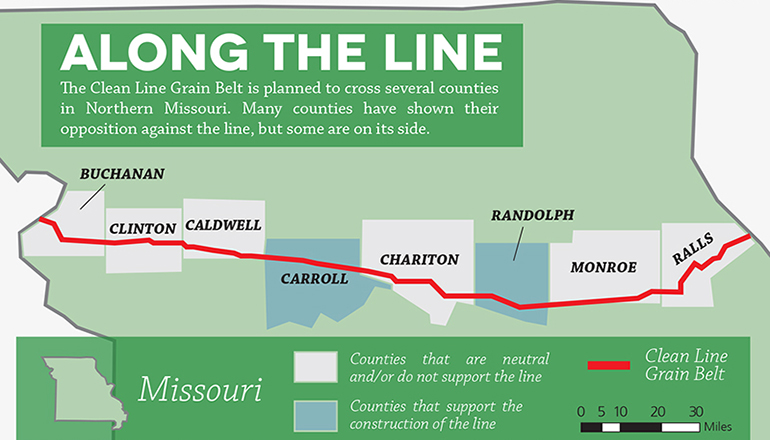The Grain Belt Express project plans to run wind power transmission lines across eight rural counties in northern Missouri—from Buchanan through Ralls. Though the Public Service Commission has approved it and the commission’s approval won a court challenge, agricultural opponents have once again found support in the Legislature.
The Missouri House passed HB 527 to stop utility company Invenergy from using its PSC-granted eminent domain power. Wednesday, the Senate Commerce, Consumer Protection, Energy and the Environment Committee heard about two hours of testimony on the Senate version of the bill, SB 508, now championed by State Sen. Jason Bean, R-Holcomb.
Disagreement over the power line projects pits farmers on the transmission route in the northern part of the state against county commissioners in the south, who expect the project to share electricity at lower rates.
Burrely Loftin, the Mayor of Ava Missouri told the Senate panel that his town of about three thousand could save as much as $267,000 a year.
“That’s a lot for a poor community like ours,” he said
Marilyn O’Bannon, a farmer and County Commissioner in Northeast Missouri’s Monroe County, said the powerline’s path is not fair.
“The proposed line runs through approximately five miles through the middle of all the farms my family owns, all tillable land,” she testified.
Farmer Dawn Ingles of Randolph County supports the Grain Belt Express, saying it will bring $700,000 a year in tax revenue needed for their schools. She added that it would help the power grid that suffered rolling blackouts.
A litany of testimony FOR the bill to block the Grain Belt lasted well over an hour.
Of the handful that spoke against the bill Senator Bill White, a Republican and lawyer from Dade, Jasper, and Newton counties, opposes the bill to block the project because he says the Grain Belt has already been legally approved, many times.
The bill is now being considered by the Senate Commerce, Consumer Protection, Energy and the Environment Committee.







